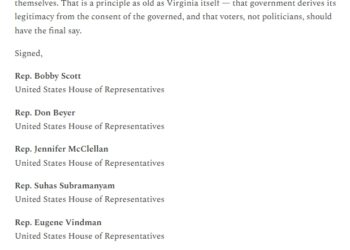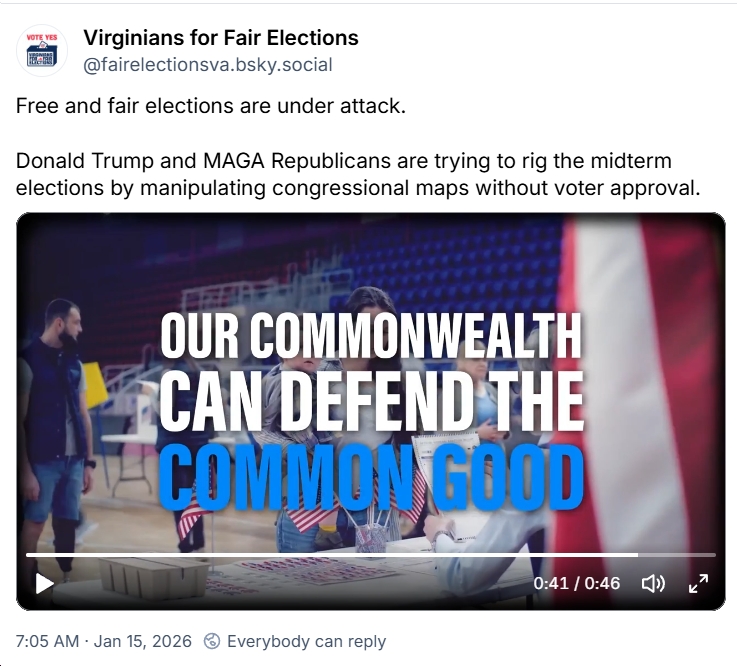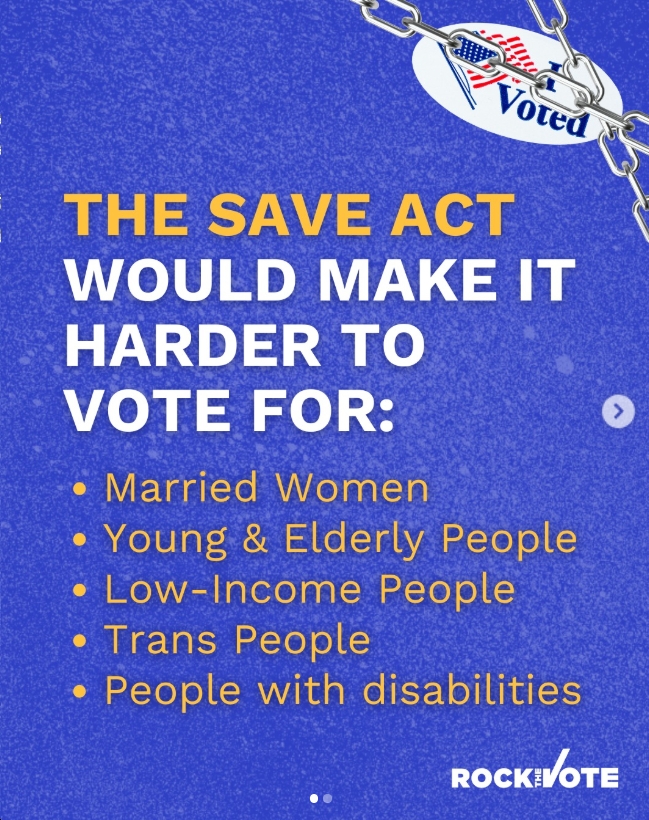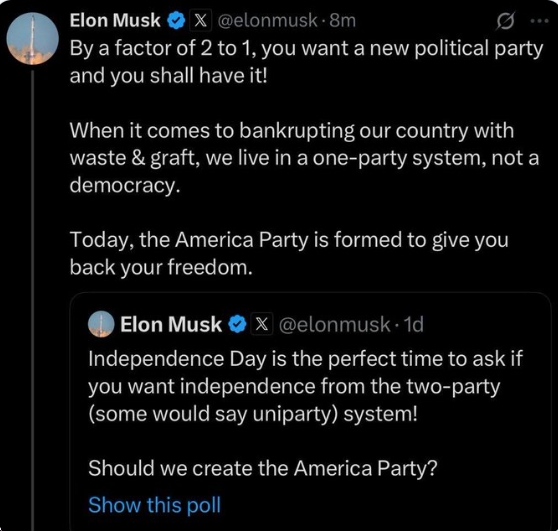 So it looks like Elon Musk has followed through on his threat to form the “America Party” after all – see his tweet to the right, in which he says, in his usual grandiloquent style:
So it looks like Elon Musk has followed through on his threat to form the “America Party” after all – see his tweet to the right, in which he says, in his usual grandiloquent style:
“By a factor of 2 to 1, you want a new political party and you shall have it!…Today, the America Party is formed to give you back your freedom.”
Musk, of course, has morphed into a far-right figure the past few years, so clearly this party won’t be “centrist” or even right-of-center. And in this case, the (apparently, or at least publicly expressed) main reason why Musk is forming his party – is his anger at Republicans who supported Trump’s Big Ugly budget bill. As Musk tweeted on June 30, “If this insane spending bill passes, the America Party will be formed the next day” and:
“Every member of Congress who campaigned on reducing government spending and then immediately voted for the biggest debt increase in history should hang their head in shame! And they will lose their primary next year if it is the last thing I do on this Earth.”
Of course, we’ll see if Musk actually follows through – spends a serious money on this, recruits candidates, etc. Based on Musk’s track record in politics, though, he can be pretty flighty and undisciplined – although certainly, he spent a TON of money to help elect Trump in November 2024, and arguably succeeded. But then Musk flopped badly in the Wisconson Supreme Court race last spring, after which he seemed to be saying that he’d pull back from politics. But now, here he is again, forming a new political party and at least *threatening* to primary “every member of Congress who campaigned on reducing government spending and then immediately voted for the biggest debt increase in history.” So if Musk’s serious, let’s see if he really follows through, primaries literally EVERY SINGLE HOUSE REPUBLICAN – or at least a lot of them! – and if the candidates he supports manage to win. Or, will Musk forgo the Republican primary strategy and, instead, skip straight to running an “America Party” candidate in the general election, alongside Republican and Democratic candidates? We’ll see, but for now, count me as skeptical that any of this amounts to anything.
Now having said all that, if – and it’s a big IF! – Musk actually follows through, recruits serious candidates, spends a ton of money, sticks with it, etc. then MAYBE he could have a serious impact on U.S. politics going forward. If so, I’d think that it could be in three main ways:
- First of all, just the thought of a multi-hundred-billionaire being willing to spend god-knows-how-much money has got to at least grab Republican incumbents’ attention. In doing so, will that change their behavior at all? Make them more likely to buck Trump in any way? At least on fiscal conservatism (which they just blew completely out of the water with the massive-debt-increasing Big Ugly Budget bill). Maybe widen fissures in the Republican Party, for instance between old-style fiscal conservatives and MAGA who-gives-a-flying-you-know-what-about-the-deficit-or-debt Republicans? Probably not, but it’s something to keep an eye on.
- Second, if Musk actually manages to get serious candidates on the ballot in a bunch of Republican-held districts in 2026, and those candidates get more than a few points in the general election, they COULD potentially flip some seats in “purple” or even “red”-leaning districts – here in Virginia, Rep. Jen Kiggans (R-VA02) and possibly Rep. Rob Wittman (R-VA01) or even Rep. John McGuire (R-VA05) – in McGuire’s case, particularly if former Rep. Bob Good were to run under the “America Party” banner – come to mind. That assumes, of course, that most of the voters for Musk’s candidates would come from the right, which is what the new poll (see below and here) by Quantus Insights shows: 57% of male Republicans and 43% of female Republicans say they’d be “very likely” or “somewhat likely” to support the “America Party,” compared to just 21% of female Democrats and just 22% of male Democrats. So that definitely appears to indicate at least the *potential* for splitting the right-leaning vote in this country, or at least siphoning off a few percentage points from a Jen Kiggans or Rob Wittman, which might be JUST enough to help elect a Democrat in some “purple” or even “red”-leaning districts…
- Assuming this party ever amount to anything, and if it continues into the 2028 presidential election cycle, it COULD impact that election – and probably in a good way for Democrats. Remember, we’ve had some seriously close elections in this country – in 2000, 2004, 2016, 2020, 2024 – so we wouldn’t need Musk’s party to get more than a few percentage points. Also, just the fact that Musk would be spending money on (and using Twitter to tout) his OWN party, not to help Republicans, could make an enormous difference.
So, again, to the extent that Musk actually follows through on this, it seems to me that it *could* – definitely not guaranteed, but COULD – have some impact on U.S. politics. Of course, American history mostly shows third-party efforts not actually winning elections. But on the other hand, there have definitely been cases where they’ve had an impact – Teddy Roosevelt’s Progressives of 1910s, Ross Perot’s independent run in 1992, George Wallace’s candidacy in 1968, etc. Plus, it’s worth noting that even though Ralph Nader in 2000 only got 2.9 million votes, that almost certainly was (more than) enough for George W. Bush to win Florida, and the presidency, over Al Gore – an outcome which obviously had HUGE impacts on the future course of American history. And in 2016, of course, the presidential election was close enough in Michigan, Wisconsin and Pennsylvania that it’s certainly possible Jill Stein’s and Gary Johnson’s presence on the ballot might have helped boost Trump just enough to win the presidency, despite losing the popular vote by 3 million. And in 2024, the number of people either staying home in protest (over Gaza, particularly) or voting third party, could have swung Michigan, Wisconsin and Pennsylvania to Donald Trump over Kamala Harris. Because in a super-closely-divided country, and particularly in a handful of key swing states, it doesn’t take much to have a huge impact on the overall outcome – with enormous consequences for the country (just imagine the difference if we had President Kamala Harris right now, or if we’d had President Hillary Clinton in 2017 or President Al Gore in 2001).
Also note, closer to home, that here in Virginia, in 1994 it’s quite possible that the independent candidacy of J. Marshall Coleman helped Sen. Chuck Robb (D) stave off Republican Oliver North. Also note that in the 2013 Virginia gubernatorial election, Libertarian candidate Robert Sarvis got 6.5% of the vote, which is significantly more than Democrat Terry McAuliffe’s 2.5-point margin of victory over Republican Ken Cuccinelli. Of course, it’s possible that Sarvis drew roughly evenly from McAuliffe and Cuccinelli, but imagine if he’d been backed by big money, a la Elon Musk, and had run on a platform that was in some ways to the RIGHT of Cuccinelli? Because that’s what we’re talking about, potentially, with Musk’s new “America Party” in 2026 and beyond. That is, if it actually amounts to anything, and if it’s not just Musk letting off steam or whatever. We’ll see, but for now, if I were Jen Kiggans, Rob Wittman, or even John McGuire, I’d be at least keeping a wary eye on this one…
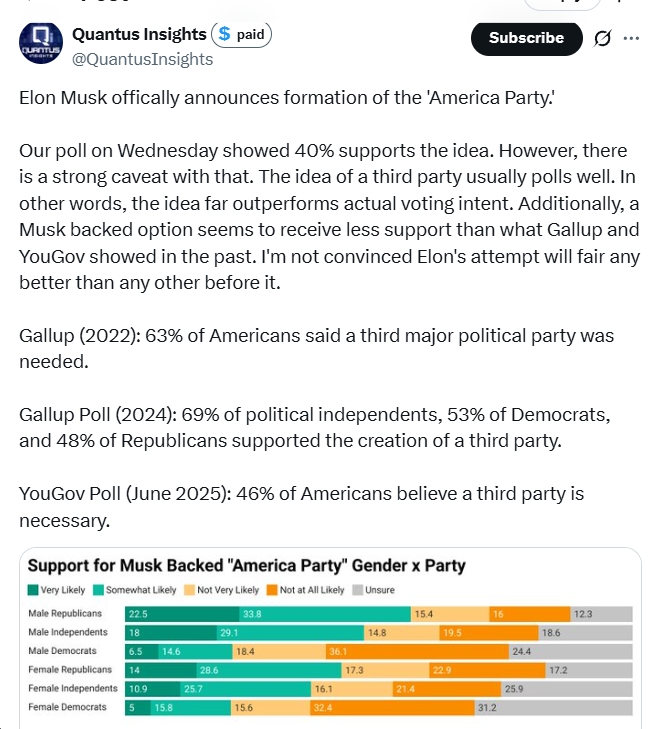

![[UPDATED with Official Announcement] Audio: VA Del. Dan Helmer Says He’s Running for Congress in the Newly Drawn VA07, Has “the endorsement of 40 [House of Delegates] colleagues”](https://bluevirginia.us/wp-content/uploads/2026/02/helmermontage.jpg)
